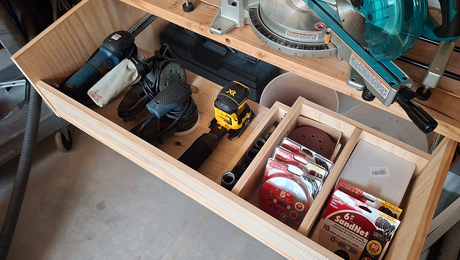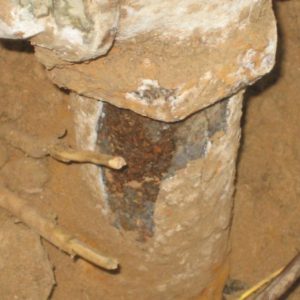Was doing some landscaping yesterday and while working near the natural gas line entrance into my home, I found that the shutoff had been buried underneath an inch or so of dirt. Directly below the shutoff, pieces of the gas pipe flaked off pretty easily. Although not pictured, farther down into the ground the pipe doesn’t look as bad/rusted. The house was built in 1955. I am wondering if this is galvanized steel and if the uncoated threads has allowed this area to rust quicker. (1) Is this correct? What other type of pipe might have been used for gas back then? and (2) Is it serious enough that I should consider having this section of pipe (and the shutoff too) replaced?
Discussion Forum
Discussion Forum
Up Next
Video Shorts
Featured Story

Listeners write in about removing masonry chimneys and ask about blocked ridge vents, deal-breakers with fixer-uppers, and flashing ledgers that are spaced from the wall.
Featured Video
SawStop's Portable Tablesaw is Bigger and Better Than BeforeHighlights
"I have learned so much thanks to the searchable articles on the FHB website. I can confidently say that I expect to be a life-long subscriber." - M.K.
Fine Homebuilding Magazine
- Home Group
- Antique Trader
- Arts & Crafts Homes
- Bank Note Reporter
- Cabin Life
- Cuisine at Home
- Fine Gardening
- Fine Woodworking
- Green Building Advisor
- Garden Gate
- Horticulture
- Keep Craft Alive
- Log Home Living
- Military Trader/Vehicles
- Numismatic News
- Numismaster
- Old Cars Weekly
- Old House Journal
- Period Homes
- Popular Woodworking
- Script
- ShopNotes
- Sports Collectors Digest
- Threads
- Timber Home Living
- Traditional Building
- Woodsmith
- World Coin News
- Writer's Digest



















Replies
Gas Pipe
Steel pipe was common back in the 50's, it looks like the protective coating has flaked off, the best thing to do is to call the supplier, should be their resposibility.
I'd definitely consider that if I had any idea who the supplier was :-)
Underground joints would be coated/taped back then, correct? I think the problem here was that this was joint wasn't originally underground. It got buried a couple of years ago when the previous owner dumped dirt around the foundation to "fix" grade issues. I assume this is what eventually caused the flaking.
Thanks for responding.
He means the guys you write the check to every month. Generally they're responsible for the pipes up to the meter.
This is on my side of the meter, right outside the house.
Call the gas company, whether or not it's on your side of the meter. They will send a tech out to have a look and tell you if it's a problem that needs attention. At least that's what our gas co. would do here, and I think gas co's everywhere have a genuine interest in avoiding leaks/explosions.
Except maybe BP.
Don't call 'em on Friday
Here at any rate-any chance of or in event of even a question of a leak-out comes the wrench, over goes the valve and bam goes the seal on it. Call us when you get it taken care of.....................
Maybe include a ruler or something in the picture....
It's kinda hard to tell what I'm looking at there, and what size it is. Perhaps also a wider shot, with the valve in it?
-- J.S.
Here's a couple wider shots.
gas pipe
Find out if that is legal now. It may have been common practice but maybe no longer. If not, gas company may fix it for you. The shut off valve should be weather protected, at least within my common sense. Hope it helps.
Gas Pipe
IF THERE IS ANY CHANCE OF A LEAK FORMING YOU HAVE TO CALL THE GAS SUPPLIER,
THIS IS NOT SOMETHING YOU SHOULD BE HANDLING YOURSELF!!
If your meter is inside your house that whole line to the meter is the suppliers responsibility!
I've seen worse....
It's not a drop everything emergency, but it needs to be fixed some day. I'd get it fixed over the summer, while the weather's nice.
-- J.S.
Frankly, I'd probably just wire brush it, slap on some rust converter, then build a box around it to keep the soil back.
I'm not sure about yer area. But in this area of KY, the gas co. won't fix it, but they will use a 'sniffer' to check for leaks. They won't fix anything on the house side of the valve by the street.
Keep in mind that if you call the gas company into this, they will probably make you bring everything up to code before they will turn your gas back on.
You can check the fittings for leaks by soaking them with dish soap and water, (1/2 & 1/2), If there is plenty of metal left and no leaks, then I'd do like another poster said, clean it up with a wire brush and coat the whole thing.
How did you handle the problem?
Hi drh,
I have a very similar problem.
May I ask how did you handle the problem?!